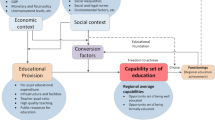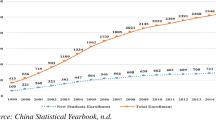Abstract
Hong Kong has tried to develop itself as a regional education hub for a decade. However, the policy is being criticized because Hong Kong has neither diversified its student population ethnically and culturally nor expanded its share in the global higher education market. This paper explores this context to examine the significance of the education hub concept in the development of higher education in Hong Kong. Based on an analysis of the concept of education hub the paper argues that the purposes of building an education hub need to be defined. It also argues that an instrumentalist interpretation of internationalization of higher education is not enough to understand the importance of the education hub notion to the higher education development in the city. An idealistic and educational approach in this respect is a relevant idea for the prospect of Hong Kong as an education hub.

Similar content being viewed by others
References
Bodycott, P. and Lai, A. (2012) ‘The influence and implications of Chinese culture in the decision to undertake cross-border higher education’, Journal of Studies in International Education 16 (3): 252–270.
Centre for Media and Communication Research [CMCR], Hong Kong Baptist University (2011) ‘CMCR’s HongCOMM survey inds: Local and non-local tertiary students choose to work in Hong Kong as their first choice’, http://www.comm.hkbu.edu.hk/cmcr/cmcr-de-news.html, accessed 11 December 2013.
Chan, D. and Ng, P.T. (2008) ‘Similar agendas, diverse strategies: the quest for a regional hub of higher education in Hong Kong and Singapore’, Higher Education Policy 21 (4): 487–503.
Cheng, Y.C., Cheung, A.C.K. and Yuen, T.W.W. (2011) ‘Development of a regional education hub: the case of Hong Kong’, International Journal of Educational Management in Education 25 (5): 474–493.
Cheung, A.C.K. (2012) ‘The impact of mutual recognition of higher education qualifications between mainland China and Hong Kong on the quality of human capital in Hong Kong’, Journal of Youth Studies 15 (2): 40–51.
Cheung, A.C.K., Yuen, T.W.W., Yuen, C.Y.M. and Cheng, Y.C. (2010) ‘Promoting Hong Kong’s higher education to Asian markets: Market segmentations and strategies’, International Journal of Educational Management 24 (5): 427–447.
Cheung, A.C.K., Yuen, T.W.W., Yuen, C.Y.M. and Cheng, Y.C. (2011) ‘Strategies and policies for Hong Kong’s higher education in Asian markets: Lessons from the United Kingdom, Australia, and Singapore’, International Journal of Educational Management 25 (2): 144–163.
Education Bureau (2013) ‘HKSAR Government Scholarship Fund’, http://www.edb.gov.hk/en/edu-system/postsecondary/local-higher-edu/publicly-funded-programmmes/scholarship.html, accessed 24 December 2013.
Education Commission Working (2011) Report on the Development of Education Services in Hong Kong, Hong Kong: Education Commission Working.
Haigh, M. (2008) ‘Internationalisation, planetary citizenship and higher education inc.’, Compare 38 (4): 427–440.
Knight, J. (2004) ‘Internationalization remodeled: Definition, approaches, and rationales’, Journal of Studies in International Education 8 (5): 5–31.
Knight, J. (2011) ‘Education hubs, a fad, a brand, and innovation?’ Journal of Studies in International Education 15 (3): 221–240.
Knight, J. (2013) ‘Education hubs: International, regional and local dimensions of scale and scope’, Comparative Education 49 (3): 374–387.
Lai, A. and Maclean, R. (2011) ‘Managing human capital in world cities: The development of Hong Kong into an education hub’, Asia Pacific Journal of Education 31 (3): 249–262.
Li, M. (2011) ‘Border crossing and market integration: Mainland consumers meet Hong Kong suppliers’, in D.W. Chapman, W.K. Cummings and G.A. Postiglione (eds.) Crossing Borders in East Asian Higher Education, Hong Kong: Springer/Comparative Education Research Centre, University of Hong Kong, pp. 319–342.
Li, M. and Bray, M. (2007) ‘Cross-border flows of students for higher education: Push-pull factors and motivations of mainland Chinese students in Hong Kong and Macau’, Higher Education 53 (6): 791–818.
Liu, M.H. (2012) ‘Hong Kong people’s misunderstanding about higher education policy: Interviewing Shih May-lung’, Hong Kong Economic Journal, 1 April.
Lo, W.Y.W. (2011) ‘Hong Kong is the vantage point of China’s higher education’, Hong Kong Economic Journal, 1 December.
Lo, W.Y.W. (2013) ‘The political economy of cross-border higher education: The intra-national flow of students in greater China’, in M. Izuhara (ed.) Handbook on East Asian Social Policy, Cheltenham: Edward Elgar, pp. 454–473.
Lo, W.Y.W. and Ng, F.S.K. (2013) ‘A critical reflection on internationalization of higher education in Hong Kong: The search for a cosmopolitan alternative’, Asia Pacific Journal of Educational Development 2 (1): 37–46.
Mok, K.H. and Cheung, A.B.L. (2011) ‘Global aspirations and strategising for world-class status: New form of politics in higher education governance in Hong Kong’, Journal of Higher Education Policy and Management 33 (3): 231–251.
Mok, K.H. and Bodycott, P. (2014) ‘Hong Kong: The quest for regional education hub status’, in J. Knight (ed.) International Education Hubs — Student, Talent, Knowledge-Innovations Models, Dordrecht: Springer, pp. 81–99.
Ng, P.T. (2011) ‘Singapore’s response to the global war for talent: Politics and education’, International Journal of Educational Development 31 (3): 262–268.
Ng, S.W. (2012) ‘Rethinking the mission of internationalization of higher education in the Asia-Pacific region’, Compare 42 (3): 439–459.
Nye, J. (2005) ‘Higher education and soft power’, in Forum Futures 2005, Cambridge, MA: Educause, pp. 11–14 https://net.educause.edu/ir/library/pdf/FFP0502S.pdf.
Organization for Economic Cooperation and Development [OECD] (2004) Internationalization and Trade in Higher Education: Opportunities and Challenges, Paris: OECD.
Organization for Economic Cooperation and Development [OECD] (2008) The Global Competition for Talent: Mobility of the Highly Skilled, Paris: OECD.
Oleksiyenko, A. (2013) ‘Opportunity structures and higher learning in a globally-connected place: Tensions and ties between outbound and upward mobility’, Higher Education 66 (3): 341–356.
Oleksiyenkoa, A., Cheng, K.M. and Yip, H.K. (2013) ‘International student mobility in Hong Kong: Private good, public good, or trade in services?’ Studies in Higher Education 38 (7): 1079–1101.
Postiglione, G.A. (2005) ‘China’s Hong Kong bridge’, in C. Li (ed.) Bridging Minds Across the Pacific: US-China Educational Exchanges, 1978–2003, Lanham: Lexington Books, pp. 201–218.
Shive, G. (2011) ‘Exporting higher education services: An engine of growth for Hong Kong?’, http://www.hkjournal.org/PDF/2010_spring/4.pdf, accessed 24 December 2013.
Skidmore, D. (2012) ‘Assessing Hong Kong’s blueprint for internationalising higher education’, The International Education Journal: Comparative Perspectives 11 (2): 81–102.
Stetar, J., Coppla, C., Guo, L., Nabiyeva, N. and Ismailov, B. (2009) ‘Soft power strategies: Competition and cooperation in a globalized system of higher education’, in L.M. Portnoi, V.D. Rust and S.S. Bagley (eds.) Higher Education Policy and the Global Competition Phenomenon, New York: Palgrave Macmillan, pp. 191–204.
Stier, J. (2004) ‘Taking a critical stance toward internationalization ideologies in higher education: Idealism, instrumentalism and educationalism’, Globalisation, Societies and Education 2 (1): 1–28.
Stier, J. (2010) ‘International education: Trends, ideologies and alternative pedagogical approaches’, Globalisation, Societies and Education 8 (3): 339–349.
Task Force on Economic Challenge [TFEC] (2009a) Recommendations from the Task Force on Economic Challenges for Promoting the Development of the Six Economic Areas, Hong Kong: Task Force on Economic Challenge.
Task Force on Economic Challenge [TFEC] (2009b) Summary of the Focus Group Discussions on the Six Economic Areas identified by the Task Force on Economic Challenges, Hong Kong: Task Force on Economic Challenge.
Trilokekar, R.D. (2010) ‘International education as soft power? The contributions and challenges of Canadian foreign policy to the internationalization of higher education’, Higher Education 59 (2): 131–147.
Tsang, Y.K. (2009) The 2009–10 Policy Address: Breaking New Ground Together, Hong Kong: Government Printer.
Tsang, Y.K. (2011) The 2011–2012 Policy Address From Strength to Strength, Hong Kong: Government Printer.
Tung, C.H. (2004) The 2004–2005 Policy Address: Seizing Opportunities for Development Promoting People-based Governance, Hong Kong: Government Printer.
Universities Grants Committee [UGC] (2004) Hong Kong Higher Education: To Make a Difference, To Move with the Times, Hong Kong: University Grants Committee.
Universities Grants Committee [UGC] (2010) Aspirations for the Higher Education System in Hong Kong — Report of the University Grants Committee, Hong Kong: Universities Grants Committee.
Universities Grants Committee [UGC] (2013) Statistics from, http://cdcf.ugc.edu.hk/cdcf/statEntry.do?lang=EN, accessed 24 December 2013.
Verger, A. (2009) ‘The merchants of education: Global politics and the uneven education liberalization process within the WTO’, Comparative Education Review 53 (3): 379–401.
Verger, A. (2010) WTO/GATS and the Global Politics of Higher Education, New York: Routledge.
Watanabe, Y. and McConnell, D.L. (eds.) (2008) Soft Power Superpowers: Cultural and National Assets of Japan and the United States, Armonk, NY: M.E. Sharpe.
Whitney, C.B. and Shambaugh, D. (2009) Soft Power in Asia: Results of a 2008 Multinational Survey of Public Opinion, Chicago: The Chicago Council on Global Affairs.
Xiang, B. and Shen, W. (2009) ‘International student migration and social stratification in China’, International Journal of Educational Development 29 (5): 513–522.
Yang, R. (2002) Third Delight: The Internationalization of Higher Education in China, New York: Routledge.
Yang, R. (2012) ‘Academic entrepreneurialism in a context of altered governance: Some reflections of higher education in Hong Kong’, Globalisation, Societies and Education 10 (3): 387–402.
Author information
Authors and Affiliations
Rights and permissions
About this article
Cite this article
Lo, W. Revisiting the Notion of Hong Kong as a Regional Education Hub. High Educ Policy 28, 55–68 (2015). https://doi.org/10.1057/hep.2014.28
Published:
Issue Date:
DOI: https://doi.org/10.1057/hep.2014.28




